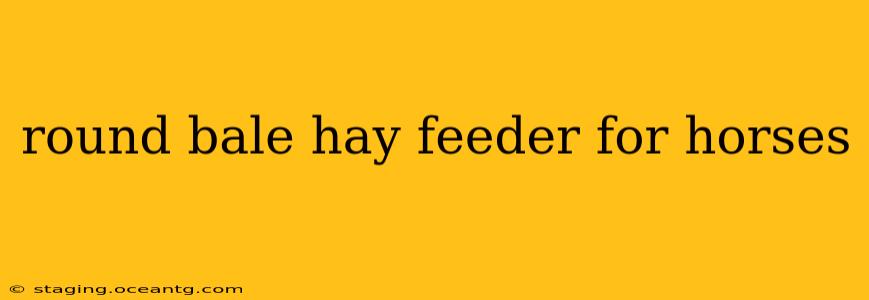Choosing the right hay feeder for your horses is crucial for their health, well-being, and efficient hay consumption. Round bale feeders offer a convenient and often cost-effective solution, but selecting the appropriate type requires careful consideration. This guide explores the various options, their benefits, and factors to consider when making your purchase.
What are the Different Types of Round Bale Hay Feeders?
Several designs cater to different needs and budgets. Common types include:
-
Gravity Feeders: These are the simplest and most affordable. The hay hangs down from the bale, allowing horses to access it easily. However, they tend to waste more hay due to trampling and spillage.
-
Slow Feeders: Designed to encourage slower eating, these feeders often incorporate a mesh or grid system that releases small amounts of hay at a time. This helps prevent colic and other digestive problems. They are generally more expensive than gravity feeders.
-
Covered Feeders: These offer protection from the elements, keeping the hay dry and preventing it from becoming soiled. They are particularly useful in wet or windy climates and often include a roof and sometimes side panels for additional protection.
-
Elevated Feeders: These raise the hay off the ground, reducing the risk of contamination from mud and manure. This design can also encourage more natural grazing behavior and improve digestion.
-
Combination Feeders: Some feeders combine features from different designs, offering a balance of convenience, efficiency, and hay conservation. For example, a slow-feed, covered feeder would combine the benefits of both types.
What are the Benefits of Using a Round Bale Hay Feeder for Horses?
Round bale feeders provide numerous advantages:
-
Convenience: They're designed to hold an entire round bale, reducing the frequency of refilling compared to smaller feeders.
-
Cost-effectiveness (Potentially): While the initial investment can be significant, the reduced hay waste can offset the cost over time, especially with slow-feed designs.
-
Reduced Hay Waste: Many round bale feeders minimize wastage compared to simply placing the bale on the ground.
-
Improved Hygiene: Elevated and covered feeders keep hay cleaner and drier, reducing the risk of mold and bacterial contamination.
-
Enhanced Digestive Health: Slow-feed feeders promote slower eating, aiding digestion and preventing digestive issues like colic.
-
Controlled Grazing: Feeders that regulate hay access allow for better control over your horse's eating habits.
How Much Does a Round Bale Hay Feeder Cost?
The price varies significantly depending on the type, size, materials used (metal, wood, plastic), and features. Simple gravity feeders can be relatively inexpensive, while sophisticated slow-feed, covered feeders can cost considerably more. Expect to pay anywhere from a few hundred to several thousand dollars.
What Size Round Bale Hay Feeder Do I Need?
The size of the feeder you need depends on the size of your round bales and the number of horses you have. Consider the daily hay consumption of your horses and choose a feeder that can hold enough hay to last for an appropriate period. Larger feeders might be more cost-effective in the long run, especially if you have multiple horses.
Are There Any Disadvantages to Using a Round Bale Hay Feeder?
While offering many benefits, round bale feeders also have some drawbacks:
-
Initial Cost: The upfront investment can be substantial.
-
Space Requirements: They require a considerable amount of space to accommodate both the feeder and the horses.
-
Potential for Damage: Some feeders might be susceptible to damage from horses chewing or kicking.
-
Maintenance: Regular cleaning and maintenance are essential to keep the feeder hygienic and functional.
What is the best round bale hay feeder for horses?
There's no single "best" feeder; the ideal choice depends on individual needs and priorities. Consider your budget, the number of horses, the size of your bales, the climate, and the specific features you prioritize (slow feeding, covered, etc.).
Choosing the right round bale hay feeder is an investment in your horse's health and your own convenience. By carefully considering the various types and their benefits and drawbacks, you can make an informed decision that best suits your specific circumstances.
